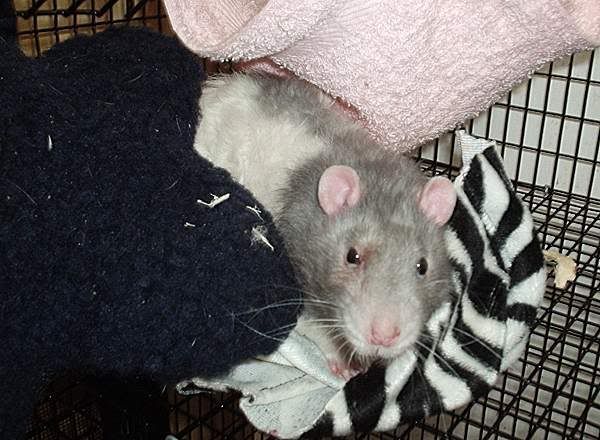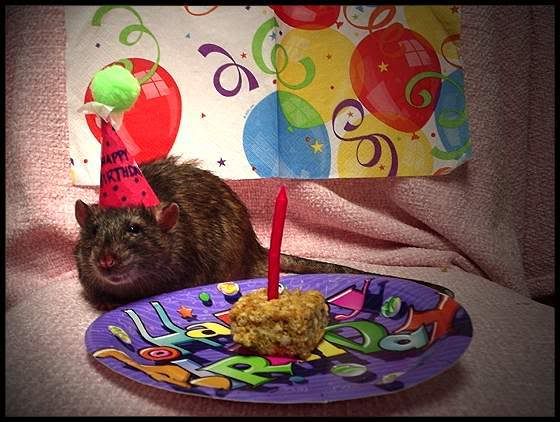I won't try to pass judgement on someone who chooses to keep big cats and other large exotics. Personally I don't like to see any large wild animal in captivity (especially things like whales and elephants. How can a tank compare to an ocean, or a few acres compare to walking a 75 miles a day?) But, I don't pretend to know nearly enough about those species, and those who care for them *properly* to pass judgement on whether those animals are happy, or even truly wild anymore. I just honestly don't know enough about it to form an educated opinion.
But, I *have* kept large reptiles before. I had a large female Burmese python. That is one animal that I can honestly say does not belong in captivity. I got her as a hatchling, and rehomed her when she was approaching 10 feet. IMO, the standards for keeping reptiles are terrible. It is considered perfectly acceptable to keep snakes in small plastic bins, barely large enough for them to turn around in, with nothing but newspaper and a water dish.
Obviously larger snakes need larger enclosures, but even a large room isn't enough for a 15 or so foot burmese python. I had my girl in a cage that was considered perfectly acceptable for her size. She could hardly turn around. It just seemed so incredibly cruel to me...she could do nothing but sit there, or drape herself over her fake tree, or soak herself in her water basin, waiting for me to hand her a dead, thawed out rabbit. It was no life for her. I ended up giving her to a guy I know who owns a pet shop and breeds burms. The enclosure he moved her in was twice the size of the one I had her in- but she had to share it with a male. Still, it was more space than she had, and I figured it was the best she could hope for. Now, whenever I see snakes that large in captivity, it seriously saddens me. They suffer from boredom and lack of stimulation just as much as mammals do, they just don't express it in ways we can easily discern. They absolutely cannot be happy living like that.
Large lizards, like monitors and iguanas, I have less of a problem with. If you can devote a room to one, provide it with plenty of toys and stimulation, and feed it a proper diet, more power to you. I've had a nile monitor, 2 savannah monitors, and a blackthroat. All except the Nile had free range of the house, were litter trained, and were very, very doglike in their behavior. Threy actually seeked out affection from us and loves having their bellies and backs scratched. I firmly believe they were perfectly happy with their lives.
Alot of people will disagree, but I DO have a bit of a problem with the way most people keep sugar gliders.
Gliders are very wild, very specialized animals. They are strictly nocturnal to the point that too much sunlight, even indirect sunlight, can harm them. Without getting into TOO much detail about their care (this post is going to be long enough [8D]) suffice it to say that I feel that unless you can provide them with an entire room or a large aviary, specialized lighting, natural looking surfaces to climb, jump from, and nest in, and a diet that mimics what they eat in the wild (not the leadbeater's diet that most glider owners feed, and certainly not the pelletized diets that are out there) plenty of interaction in the middle of the night, when they are naturally awake, AND companionship from their own species, I don't think you should have them. I know there are glider owners here that will disagree with me, but that's just my opinion. I've had gliders, and they were not happy.
Ratsicles, your rat stories remind me of keeping rabbits. People still think of rabbits as cheap animals you keep in a hutch outside until you wake up one morning to find it's died of something that would have been preventable if you'd realised the rabbit was sick. My last rabbit was every bit as much of a handful as a puppy. I've trained my current one to beg for treats and used a clicker to teach her to accept strokes and brushes. It breaks my heart when I think of all those rabbits out there that get kept in isolation in a hutch so small they can't even stand up in it.
Rats are definitely much the same. They get lumped in with hamsters, mice, and gerbils, when rats are so, so SO much different from them. They're not mindless animals that can be left in a cage with a wheel to run on and no human interaction. Rats are the closest things I have found to a dog. They are incredibly intelligent, great problem solvers, and CRAVE interaction with humans. Well bred domestic rats do not need to be tamed as babies...they naturally crave human contact and are miserable without it. They are also opportunistic predators- they're in a weird postion- they're both predator and prey. Their brains seem to be more geared towards that or a predator, in that they work together in groups (I have seen rats hunt in a pack before, using many of the same tactics wolves do), are great problem solvers, and are just generally very unlike strictly herbivorous rodents. They don't really have rodent brains.
So often though people get them, and comparing them to a hamster, stick them in a 10 gallong aquarium, alone, feed them hamster food (which would be the equivalent of expecting a dog to live off of hay) give them no toys, and ignore them. Without companionship, and plenty of mental stimulation, rats waste away fast. I have rescued many pet rats who came from that type of situation who were never able to live normal lives again. They didn't know how to play, how to build nests or use blankies and hammocks, how to interact with other rats, or how to even eat real food. They would sit in a corner, alone, and occasionally drag themselves to a food bowl to look for something that resembled the horrible food they were used to eating. Some of them would eventually recover, many wouldn't. Most of them because violently aggressive, and I have the scars to prove it. It's akin to keeping a dog in a crate locked in a dark room for its entire life, never letting it out, never talking to it, barely feeding it....only with rats, this is considered perfectly acceptable by the general public. [&o] Most people would never know there was anything wrong with them.
But on the subject of wild animals- I think that in some cases (certainly not every case) species that are completely domesticated are considered "wild." Ferrets come to mind, but I know more about rats so I'll use them as an example. In Alaska, it is illegal to own anything other than a PEW (Pink eyed white) rat. The rationale is that all other colors are "closer to wild rats" and therefore more likely to survive and cause problems if released. Now, that's a huge problem. It's exactly like saying that people should only be able to own white dogs, because all other colors of dogs are closer to wolves and more likely to become feral. There are no "breeds" of rats- only varieties. All rats are variations of the same "breed" (species) (it isn't a breed, since there are no breeds of rats, but it's the best way I can explain it.) All of the different colors, coat types, ear types, and body types are just variations of the Norway Rat. Saying that a blue rat is more likely to become wild than a white rat is like saying that a black dog is more likely to become feral than a white dog. But, because of the ignorance involved, they've managed to ban all but a certain *color* of these animals from being owned in that area. If they find you with a black rat, or any other color, they confiscate it and euthanize it. It's insane.
That's why I don't pass judgement on species that I don't know a ton about. It seems like a problem to keep tigers to me, but I know nothing about tigers. Many people have a problem with keeping rats, but they know nothing about rats. Domestic rats are just that- domestic. I honestly have never heard of TRUE domestic rats successfully going wild again. Most of them have no natural fear of predators, don't really know how to find food, trust humans...they just wouldn't make it. It would be the same as releasing a poodle into the woods and saying "oh, it'll be fine, dogs are related to wolves after all." And yet, because people know nothing about them, laws have been passed in several places that list them as "wild animals" and subsequently ban them. That terrifies me- that I may lose the right to own a species that I love because of other people's fear and ignorance.
So, I do my best not to pass judgement. Too many unfair and irrational laws are passed pertaining to exotics ownership because of the perpetuation of misinformation.
Do these look like wild animals to you? [

]


ETA:
OK, quick hijack, but Ratsicles, I remember seeing your website years ago when I was breeding Rex and Hairless rats. Small world!!
Oh cool! Were they genetic hairlesses or double rex based? Very cool if you were successful with true hairlesses. I was too scared to go there because of the lactation issues in some lines. (This coming from a person who was getting ready to work with High Whites before I quit...[sm=lol.gif])